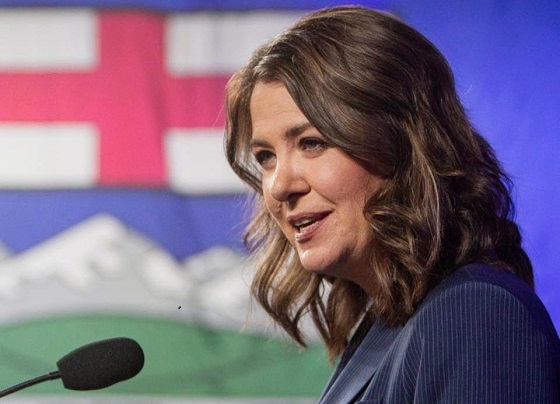Uncategorized
When America attacks

Paul Wells interviews Alberta Premier Danielle Smith
It’s beginning to look a lot like statehood: Danielle Smith and more on the pod
Here’s Justin Trudeau, urging Pierre Poilievre to declare whether he stands with Canada or with “Danielle Smith, Kevin O’Leary, and ultimately, Donald Trump.” The great thing about a wedge is it can always do more wedging. Meanwhile Danielle Smith is still the premier of Alberta and she’s my first guest this week.
At one point in our interview — which makes Smith the third consecutive Alberta premier to appear on this podcast, so don’t be shy, François Legault — Smith says she asked Trump at Mar-a-Lago whether he’d like to buy more Alberta oil. We’re coming off a truly weird couple of weeks when people were falling over themselves to call Smith a traitor or sellout for that kind of talk. Which is odd for several reasons, including this: as my guest from two weeks ago, former US ambassador David L. Cohen, pointed out, Alberta already sells immense amounts of oil into the American market. So it’s not some deranged fantasy to imagine it might sell more.
I never liked the “Team Canada” talk that swept through this country like a bad fashion trend after Trump tweeted his threat of 25% blanket tariffs on Canadian and Mexican imports. I kind of don’t care who’s offside that sort of coerced and silly unanimity, or for what reasons: it will always be somebody, and the social capital you burn up in a futile attempt to enforce the party line will be a terrible, stupid waste. Kids, ask your parents about the Charlottetown Accord referendum. That it turned out this time to be the premier of the province with by far the most to lose from some counter-tariffs or, especially, from an oil export ban should not have been a big shocker. The party-line approach is also a strange response. There’s no Team America. Donald Trump will be challenged in court for everything he does for the rest of his time in office, often by state governors, and encouraging those natural divisions among our American friends makes more sense than forbidding natural divisions at home.
This may have something to do with why Louis St. Laurent, in his 1947 Gray Lecture, named national unity as the paramount value in Canadian foreign policy, ahead of liberty and the rule of law. “No policy can be regarded as wise which divides the people whose effort and resources must put it into effect,” he said, in one of the most enthusiastically ignored lessons in Canadian political history.
As it turns out, I think the air was already going out of the Team Canada balloon before Smith joined me on a Zoom call. Voices have been piping up, including economist Trevor Tombe on David Herle’s podcast, warning about substantial permanent economic cost in exchange for not much political gain.
I think I’ve made it pretty clear where I stand on all this. Smith makes herself pretty clear too.
Subscribe to Paul Wells.
For the full experience, upgrade your subscription.
I added a second guest because I knew my time with Smith would be finite, and because we have so much to talk about these days. My second guest is Amy Greenberg, who’s one of the leading historians of the antebellum United States (1800-1860, the period leading up to the Civil War.)

She’s a former Guggenheim Fellow, an award-winning teacher, and the author of five books, many of which grapple with the notion of manifest destiny — the idea that the United States, as a historic vanguard of liberty, must keep growing until it filled a continent.
Manifest destiny is a founding American myth, a uniquely powerful intersection of messianism and acreage. You know who’d have a feeling for that sort of thing? A real estate man from Queen’s. But Greenberg, understandably, was reluctant to analyze anything Trump might be up to. She’s happy to stick to what she knows, but that’s fascinating enough: American expansionism as a project of zealots, but also of scoundrels eager for a distraction. The idea of annexing Texas, which became the Mexican-American War and thus the topic of Greenberg’s most prominent book, occurred to the hapless accidental President John Tyler while he was facing impeachment and after the Whigs’ congressional wing had kicked him out of the party. And as she points out in an earlier book with the intriguing title Manifest Manhood, the expansionist impulse is also an expression of a certain idea of robust and aggressive masculinity. Just remember, she’s not talking about Donald Trump.
You can listen to this episode on Apple Podcasts and a bunch of other platforms via the “Listen On” button that you can see at the top of this post when you view it on your desktop browser. If you listen on a podcast platform, hit “Like” and “Subscribe” buttons, and leave a good review, to help spread the word.
You can read a (machine-generated) transcript of this week’s episode via the “Transcript” button at the top of this page when you view it on your desktop browser.
I am grateful to be the Max Bell Foundation Senior Fellow at McGill University, the principal patron of this podcast. Antica Productions turns these interviews into a podcast every week. Kevin Breit wrote and performed the theme music. Andy Milne plays it on piano at the end of each episode. Thanks to all of them and to you. Please tell your friends to subscribe to The Paul Wells Show on their favourite podcast app, or here on the newsletter.
Subscribe to Paul Wells.
For the full experience, upgrade your subscription.
Uncategorized
Cost of bureaucracy balloons 80 per cent in 10 years: Public Accounts

The cost of the bureaucracy increased by $6 billion last year, according to newly released numbers in Public Accounts disclosures. The Canadian Taxpayers Federation is calling on Prime Minister Mark Carney to immediately shrink the bureaucracy.
“The Public Accounts show the cost of the federal bureaucracy is out of control,” said Franco Terrazzano, CTF Federal Director. “Tinkering around the edges won’t cut it, Carney needs to take urgent action to shrink the bloated federal bureaucracy.”
The federal bureaucracy cost taxpayers $71.4 billion in 2024-25, according to the Public Accounts. The cost of the federal bureaucracy increased by $6 billion, or more than nine per cent, over the last year.
The federal bureaucracy cost taxpayers $39.6 billion in 2015-16, according to the Public Accounts. That means the cost of the federal bureaucracy increased 80 per cent over the last 10 years. The government added 99,000 extra bureaucrats between 2015-16 and 2024-25.
Half of Canadians say federal services have gotten worse since 2016, despite the massive increase in the federal bureaucracy, according to a Leger poll.
Not only has the size of the bureaucracy increased, the cost of consultants, contractors and outsourcing has increased as well. The government spent $23.1 billion on “professional and special services” last year, according to the Public Accounts. That’s an 11 per cent increase over the previous year. The government’s spending on professional and special services more than doubled since 2015-16.
“Taxpayers should not be paying way more for in-house government bureaucrats and way more for outside help,” Terrazzano said. “Mere promises to find minor savings in the federal bureaucracy won’t fix Canada’s finances.
“Taxpayers need Carney to take urgent action and significantly cut the number of bureaucrats now.”
Table: Cost of bureaucracy and professional and special services, Public Accounts
| Year | Bureaucracy | Professional and special services |
|
$71,369,677,000 |
$23,145,218,000 |
|
|
$65,326,643,000 |
$20,771,477,000 |
|
|
$56,467,851,000 |
$18,591,373,000 |
|
|
$60,676,243,000 |
$17,511,078,000 |
|
|
$52,984,272,000 |
$14,720,455,000 |
|
|
$46,349,166,000 |
$13,334,341,000 |
|
|
$46,131,628,000 |
$12,940,395,000 |
|
|
$45,262,821,000 |
$12,950,619,000 |
|
|
$38,909,594,000 |
$11,910,257,000 |
|
|
$39,616,656,000 |
$11,082,974,000 |
Uncategorized
New report warns WHO health rules erode Canada’s democracy and Charter rights

The Justice Centre for Constitutional Freedoms has released a new report titled Canada’s Surrender of Sovereignty: New WHO health regulations undermine Canadian democracy and Charter freedoms. Authored by Nigel Hannaford, a veteran journalist and researcher, the report warns that Canada’s acceptance of the World Health Organization’s (WHO) revised International Health Regulations (IHR) represents a serious erosion of national independence and democratic accountability.
The IHR amendments, which took effect on September 19, 2025, authorize the WHO Director-General to declare global “health emergencies” that could require Canada to follow directives from bureaucrats in Geneva, bypassing the House of Commons and the will of Canadian voters.
The WHO regards these regulations as “binding,” despite having no ability or legal authority to impose such regulations. Even so, Canada is opting to accept the regulations as binding.
By accepting the WHO’s revised IHR, the report explains, Canada has relinquished its own control over future health crises and instead has agreed to let the WHO determine when a “pandemic emergency” exists and what Canada must do to respond to it, after which Canada must report back to the WHO.
In fact, under these International Health Regulations, the WHO could demand countries like Canada impose stringent freedom-violating health policies, such as lockdowns, vaccine mandates, or travel restrictions without debate, evidence review, or public accountability, the report explains.
Once the WHO declares a “Pandemic Emergency,” member states are obligated to implement such emergency measures “without delay” for a minimum of three months.
Importantly, following these WHO directives would undermine government accountability as politicians may hide behind international “commitments” to justify their actions as “simply following international rules,” the report warns.
Canada should instead withdraw from the revised IHR, following the example of countries like Germany, Austria, Italy, Czech Republic, and the United States. The report recommends continued international cooperation without surrendering control over domestic health policies.
Constitutional lawyer Allison Pejovic said, “[b]y treating WHO edicts as binding, the federal government has effectively placed Canadian sovereignty on loan to an unelected international body.”
“Such directives, if enforced, would likely violate Canadians’ Charter rights and freedoms,” she added.
Mr. Hannaford agreed, saying, “Canada’s health policies must be made in Canada. No free and democratic nation should outsource its emergency powers to unelected bureaucrats in Geneva.”
The Justice Centre urges Canadians to contact their Members of Parliament and demand they support withdrawing from the revised IHR to restore Canadian sovereignty and reject blind compliance with WHO directives.
-

 Alberta17 hours ago
Alberta17 hours agoPremier Smith explains how private clinics will be introduced in Alberta
-

 Health2 days ago
Health2 days agoTens of thousands are dying on waiting lists following decades of media reluctance to debate healthcare
-

 Alberta15 hours ago
Alberta15 hours agoAlberta introducing dual practice health care model to increase options and shorten wait times while promising protection for publicly funded services
-

 Aristotle Foundation13 hours ago
Aristotle Foundation13 hours agoWe’re all “settlers”
-

 Opinion2 days ago
Opinion2 days agoLandmark 2025 Study Says Near-Death Experiences Can’t Be Explained Away
-

 Business16 hours ago
Business16 hours agoUS Supreme Court may end ‘emergency’ tariffs, but that won’t stop the President
-

 Business2 days ago
Business2 days agoBudget 2025: Ottawa Fakes a Pivot and Still Spends Like Trudeau
-

 Indigenous8 hours ago
Indigenous8 hours agoIndigenous activist wins landmark court ruling for financial transparency





